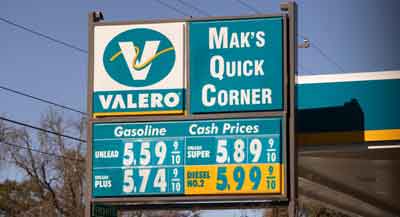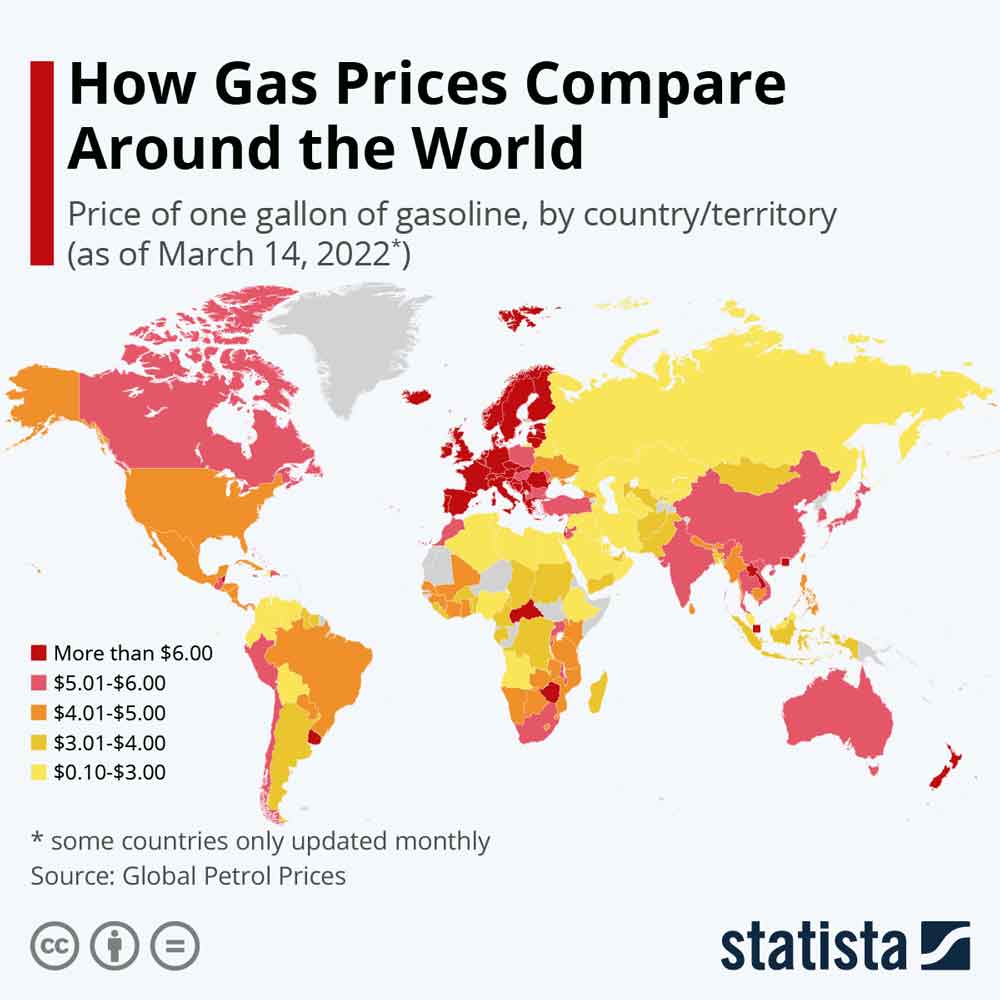How Gas Prices Compare Around The World
Tyler Durden
 The Russian invasion of Ukraine has driven up oil and other commodity prices in many countries, with gasoline prices turning into a topic of discussion around the world. However, as Statista's Katharina Buchholz details below,as taxes are making up a big chunk of the gas price in the majority of industrialized nations, countries taxing gasoline at lower rates will still see lower gas prices in comparison. One example of this is the United States. The Russian invasion of Ukraine has driven up oil and other commodity prices in many countries, with gasoline prices turning into a topic of discussion around the world. However, as Statista's Katharina Buchholz details below,as taxes are making up a big chunk of the gas price in the majority of industrialized nations, countries taxing gasoline at lower rates will still see lower gas prices in comparison. One example of this is the United States.

Even at a gas price of more than $4.00 per gallon, Americans are still paying much less to fill up their cars than people in many industrialized nations, including other car-based economies like Brazil, Australia or South Africa. According to website Global Gas Prices, the latter two nations were already paying upwards of $5.00 for a gallon, while prices in Brazil were approaching $4.94.
Europe has some of the highest gasoline prices in the world. Most of Western Europe was paying upwards of $6.00 for a gallon of gas as of March 14, with some of the highest prices being charged in the Netherlands, Finland, Germany, Italy and Norway. Germany was the most expensive major European economy in terms of gas prices most recently, as a gallon was going for $9.12. Norway is an outlier among oil producing countries as it taxes gasoline at a premium. The country bases lots of its wealth on oil but has for many years pursued a plan to make its own economy independent of the fossil fuel.
Other oil producers have gone the opposite route, offering gasoline to its citizens for less than the price of bottled water. The most drastic examples for this are Venezuela, Libya and Iran, where gasoline only costs a couple of cents per gallon.
The most expensive gallon of gas included in the ranking, however, was being sold in Hong Kong at $10.90, which would typically cause filling up even a small car to break the $100 barrier. East Asia was the priciest part of the world for gas after Europe, with prices high in India, China, Japan, South Korea and Thailand – all of which are major oil consumers, but not producers. Deep pockets are also needed in a few countries where weak government or trade structures have led to a hike in prices, like in Zimbabwe and the Central African Republic.
World regions with cheap gas prices included North Africa and the Middle East as well as in Central Asia and Russia. In Algeria, for example, gas costs only around $1.20 per gallon, while in Russia, the price was approximately $1.60.
 our mission: our mission:
to widen the scope of financial, economic and political information available to the professional investing public.
to skeptically examine and, where necessary, attack the flaccid institution that financial journalism has become.
to liberate oppressed knowledge.
to provide analysis uninhibited by political constraint.
to facilitate information's unending quest for freedom.
our method: pseudonymous speech...
Anonymity is a shield from the tyranny of the majority. it thus exemplifies the purpose behind the bill of rights, and of the first amendment in particular: to protect unpopular individuals from retaliation-- and their ideas from suppression-- at the hand of an intolerant society.
...responsibly used.
The right to remain anonymous may be abused when it shields fraudulent conduct. but political speech by its nature will sometimes have unpalatable consequences, and, in general, our society accords greater weight to the value of free speech than to the dangers of its misuse.
Though often maligned (typically by those frustrated by an inability to engage in ad hominem attacks) anonymous speech has a long and storied history in the united states. used by the likes of mark twain (aka samuel langhorne clemens) to criticize common ignorance, and perhaps most famously by alexander hamilton, james madison and john jay (aka publius) to write the federalist papers, we think ourselves in good company in using one or another nom de plume. particularly in light of an emerging trend against vocalizing public dissent in the united states, we believe in the critical importance of anonymity and its role in dissident speech. like the economist magazine, we also believe that keeping authorship anonymous moves the focus of discussion to the content of speech and away from the speaker- as it should be. we believe not only that you should be comfortable with anonymous speech in such an environment, but that you should be suspicious of any speech that isn't.
www.zerohedge.com
|




